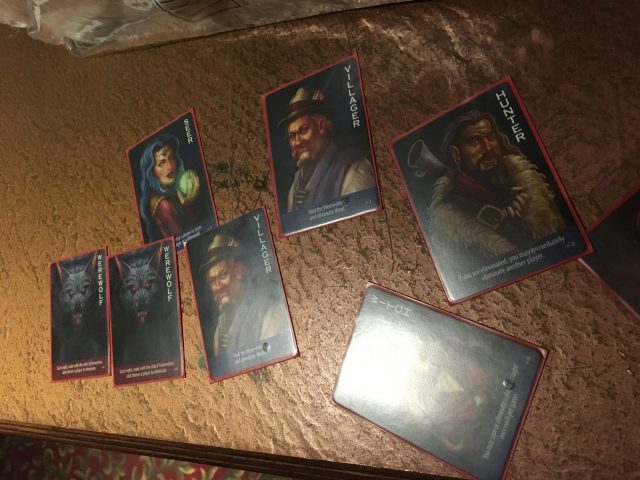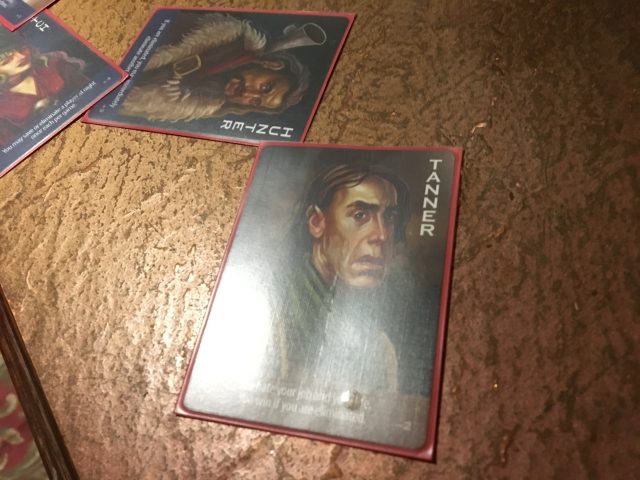“Linda’s been sketchy for a while now and even if she isn’t bad, she’s not helping out the village. We need to lynch her,” Tina declares.
“Linda, your defence,” the moderator says.
“You guys are making a big mistake and are playing into the hands of the werewolves,” Linda says.
“Time to vote,” the moderator says.
Of the group of 15 people at least 10 hands go up, “I don’t need to count. That’s enough to lynch,” the moderator says before picking up a card in front of Linda. “You are dead. Do you have anything to say Linda?”
“Awwwoooooo,” Linda howls.
“You have killed a werewolf,” the moderator says.
A cheer rises from the village.
Werewolf, Mafia, Ultimate Werewolf. The granddaddy of social deduction games has many different names and variations, but at its heart is a very simple team versus team game. There are no boards or dice. Most of the time it just consists of one card for every person that identifies if they are a villager or a werewolf. The villagers win if all of the werewolves are killed. The werewolves win if they reach parity with the village (meaning there are the same amount of villages and werewolves).

The game is played in a series of days and nights. During the day everyone is awake and arguing about who they can and cannot trust. At any point players can nominate someone else to be lynch. If a nomination is seconded, the nominator and whoever seconded make their case for lynching. The accused gets a defence and then the villages votes. If the majority of players vote to lynch, the target is eliminated from the game. During the night phase the werewolves (who all know each other) wake up and eat someone. That person is eliminated from the game, brining the werewolves one step closer to victory.
In larger games things can get much more complicated. The game requires a moderator who will set up the structure of the village (how many villagers, how many werewolves, etc.). Depending on the size of the game the moderator can add villagers that have a wide range of special powers, including ones that can gives information or help save players from being eaten during the night phase. There are also superpower werewolves if the moderator feels the game is too in favour of the village and lastly a whole series of characters that can transform what was a simple team versus team situation into a mind-breaking game where seven different groups of people are vying for victory.
For the past year and a half every other Saturday a diverse group of 20-35 people get together in the second floor of a pub in downtown Toronto to decide the fate of the village. In that time I’ve played more than 50 games of Werewolf, some of them I’ve been frustratingly killed early and others have stretched on for three or four hours of tense arguments and manipulation that led to triumphant victories or bitter defeats. Here are some of the things I have learnt playing Werewolf.

Lying is fun
“Bob, you know me pretty well and you know that I’m a horrible liar. If I was a werewolf it would be all over my face,” Louise says (while actually a werewolf).
Many of the people who play Werewolf love being a werewolf. Deceiving and lying to your friends and perfect strangers is totally acceptable and expected in a game of Werewolf.
Deduction is fun
“I know Teddy and Ollie are good, which means that one, or potentially both, of Tammy and Jimmy are werewolves,” Andy says.
While playing a basic villager might not seem like the most exciting role to play, it can be the most rewarding. Leading your team to victory as a villager with no information, using your wit and deduction skills to overcome the evil werewolf team is incredibly satisfying.
People hold grudges
“You tricked me last game, so I can’t trust you,” Gene says.
When you find a regular group of Werewolf players, some of your fellow players will subscribe to Quebec’s motto, Je me souviens (I remember). Did you just successfully convince your best friend you weren’t a werewolf when you were? Well the next game they might immediately put you on the chopping block. Did you lead the lynch of an innocent villager early in the previous game? Watch out that person might be out to get you the next time you play with them.
Despite the fact that each Werewolf game is an independent entity, when you play with the same people over and over again, past games and past actions get referenced and “metagaming” can be a bit of a problem, but can also lead to some fun interactions between players.
Beware of the quiet player
“I’m just a naturally quiet person. That doesn’t mean I’m on the werewolf team,” Gayle says.
A game that relies mostly on the discussion of the players involved might make you think that Werewolf only appeals to extroverts, but you would be wrong. Some of the best players are those that would describe themselves as introverts. Being a quiet werewolf, blending into the surroundings can be very effective. Being a quiet villager means you might pick up on clues that those who are dominating the conversation miss. This leads into my next point.
Listening is important
“What did you just say there? We all know that Felix is good. You just randomly accused a proven good person. I think you are a werewolf,” Daryl says.
Sitting back and paying attention to the other players is a very important thing to do whether you are a villager trying to figure a werewolf who is trying to manipulate the game or playing as a werewolf hoping to find a villager who stumbles and makes themselves a target for lynching.
Chaos reigns
“I don’t know what is going on here. My brain hurts. Hugo you’ve accused nearly everyone at the table and I don’t know if that means you are a good player who is trying to figure things out or if you are just trying to confuse everyone,” Rudy says.
As previously mentioned people will remember how you play from game to game, so some players will try to behave the same way whether they are villager or a werewolf in order, others just behave chaotically from game to game making it hard to tell what side they are on.
Diversity is important
Living in one of the more multicultural cities of the world, Toronto, means that the people who show up to our regular werewolf group come from a wide variety of backgrounds. Whether it’s an Irish computer programmer, a professor from Brooklyn, an Iranian personal assistant, a banker from Hong Kong, an Indian construction worker or a boring old editor who grew up five subway stops away, everyone has an interesting perspective on how to play werewolf. A diverse group means that you are going to get different personality types who think and act in a variety of ways that might never occur to you. Repeated games of werewolf with the same people can get stale and potentially predictable. New players should always be welcomed because you never know what they can add to the werewolf stew (which of course is filled with dead villagers).
As a bonus, here is a trailer for the greatest Werewolf movie of all time!
Comments
No comments yet! Be the first!